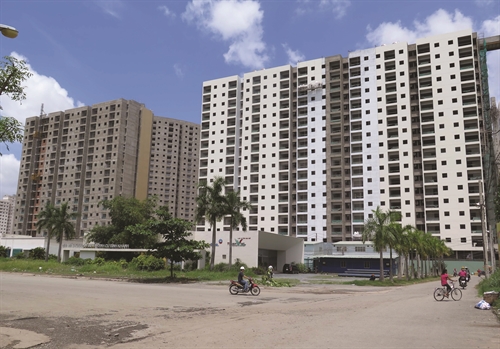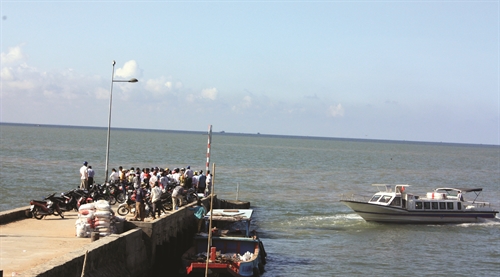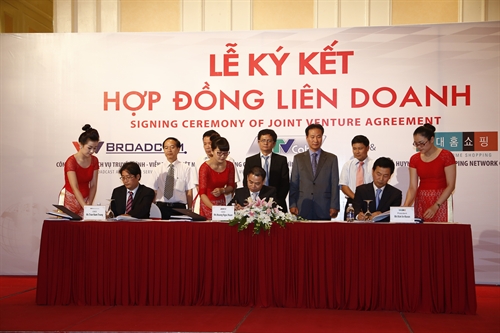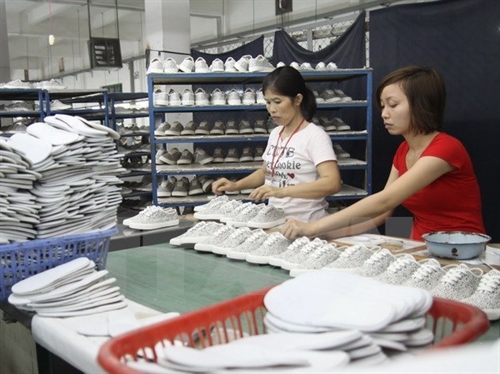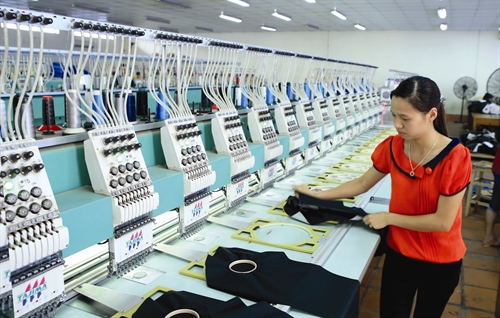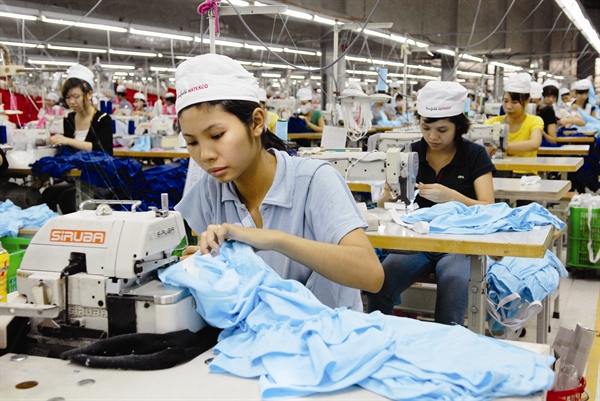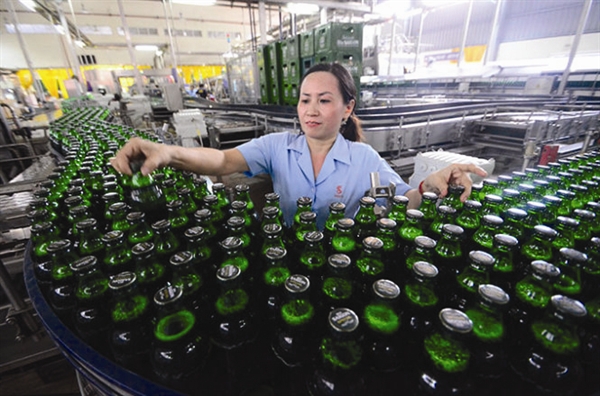* Prime Minister urges issuance of regulations on conditional investment, business lines before year-end
In an Official Letter dated October 8 on implementation of Government Resolution No. 59/NQ-CP dated August 7, on implementation of the Enterprises Law and Investment Law, the Prime Minister assigned regulation-making tasks to ministries and local administrations. Results of the performance of these tasks will be reported to the Ministry of Planning and Investment for summary and reporting to the Government at its December regular meeting.
The Ministry of Finance is requested to accelerate the drafting of decrees on betting on horse and dog races and international football matches and on voluntary pension funds, which must prescribe specific investment or business conditions for bet-taking and voluntary pension fund management services.
The Ministry of Public Security is assigned to supplement regulations on security and order conditions for four business lines, including betting service, cosmetic surgery service, trading in mobile signal jammers and uniforms, weapons and technical equipment for military and public security forces, and trading in special-use components, parts, materials and equipment and technologies for manufacturing them, and then incorporate them in a decree to replace Decree No. 72/2009/ND-CP, prescribing security and order conditions for a number of conditional business lines.
The Prime Minister urges the drafting by the Ministry of Health of a decree on management of medical instruments and equipment, prescribing investment and trading conditions for trading in medical instruments, operation of establishments engaged in classifying medical instruments and provision of medical instrument testing service, and revision of regulations guiding the Law on Medical Examination and Treatment without prescribing business conditions in a circular guiding such decree. The Ministry of Health will have to finalize three draft decrees amending Decree No. 56/2008/ND-CP on operation of a tissue bank and a national coordination center for human body organ transplanting, prescribing the grant of practice certificates for medical practitioners and operation licenses for medical examination and treatment establishments, and prescribing conditions for pharmaceutical trading.
The Ministry of Information and Communications is tasked to revise regulations on specific conditions for provision of the services of processing, repairing and renewing used information technology appliances on the list of those banned from import for foreign partners. In case of necessity to prescribe conditions to facilitate the state management, the ministry should draft a decree prescribing investment and trading conditions instead of a ministerial circular. Specifically, the ministry will have to draft a decree amending Decree No. 25/2011/ND-CP detailing a number of articles of the Law on Telecommunications, and a decree detailing business conditions in the field of information security.
The Prime Minister requests the State Bank to draft a decree on conditions for the business line of debt trading and debt trading service provision.
The Ministry of Industry and Trade is assigned to revise regulations on competence and procedures for granting business and establishment licenses for retail stores of foreign-invested enterprises and relevant provisions of Decree No. 23/2007/ND-CP on goods purchase and sale and activities directly related to goods purchase and sale by foreign-invested enterprises in Vietnam.
The Ministry of Transport will draft a decree on conditions for provision of maritime safety assurance services.
Drafting ministries may ask for the Prime Minister’s permission for application of summary order and procedures under the Law on Promulgation of Legal Documents for drafting and enacting the aforesaid documents while ensuring simple, convenient, transparent and cost-saving conditions for investors to comply with.-
* Working team formed to control sub-licenses for conditional business lines
The Prime Minister on September 28 decided to form a working team, headed by Minister of Planning and Investment Bui Quang Vinh, to assist him in supervising the implementation of the Enterprises Law’s and the Investment Law’s provisions on conditional investment sectors and business lines.
In response to a report by the National Competition Forum on the situation that some ministries were still eager to issue their own business conditions, the Ministry of Planning and Investment recently showed its special concern, affirming that such action is unlawful under the Investment Law and harmful to the effect of the Law and undermining businesses’ confidence in effectiveness of business environment improvement. This is because the Investment Law clearly stipulates that in case of any difference between the provisions of the Investment Law and another law on conditional investment sectors or business lines, the Investment Law would prevail. In other words, ministries are against the law when basing themselves on specialized laws to prescribe conditions for specific business lines under their management.
To address the problem, a draft decree guiding the Investment Law regards all eligibility certificates, practice certificates, professional liability insurance certificates, requirements, standards, criteria and conditions which must be possessed or satisfied by economic institutions or businesspersons to conduct their business activities as business conditions. This decree follows the spirit of the Investment Law and Resolution No. 19/2015/NQ-CP which deprive ministries, sectors and localities of the power to prescribe business conditions and conform to international practices that focus on post-licensing inspection.
The working team may request ministries, ministerial-level agencies, government-attached agencies, local administrations and relevant agencies to coordinate with it and report on the implementation of the Enterprises Law, Investment Law and Resolution No. 19, especially provisions aimed to prevent the issuance of new sub-licenses, comprehensively reform business conditions, and eventually get rid of the current sub-licensing system.-
* Auction of non-performing loans proposed to be regulated by the Property Auction Law
In examining the draft Law on Property Auction, the National Assembly’s Economic Committee found it necessary to include some provisions on auction of non-performing loans and security property for these loans in the Law in order to have more legal grounds for the settlement of non-performing loans, especially those of commercial banks.
According to Committee Chairman Nguyen Van Giau, at present the auction of non-performing loans and security property for these loans are regulated by sub-law documents of low legal effect and this is one of the reasons for delayed settlement of these loans.
State Bank Deputy Governor Nguyen Dong Tien said that the State Bank was responsible for drafting the chapter on the auction of non-performing loans and security property for these loans in the Law.
Submitted to the National Assembly on October 12, the draft Law was expected by the Government to establish procedures for auctioning all types of property, except state property located and securities held overseas, and ensure publicity, transparency and impartiality of auctioning activities.-
* Higher excise tax to be levied on vehicles with high engine displacement
The Government has recently proposed to the National Assembly higher excise tax rates on vehicles with high engine displacement. If approved, the excise tax rates will increase from 60 to 90 percent, 60 to 110 percent, and 60 to 130 percent for vehicles with an engine displacement of between 3,000 cu.m and 4,000 cu.m; between 4,000 cu.m and 5,000 cu.m; and between 5,000 cu.m and 6,000 cu.m, respectively.
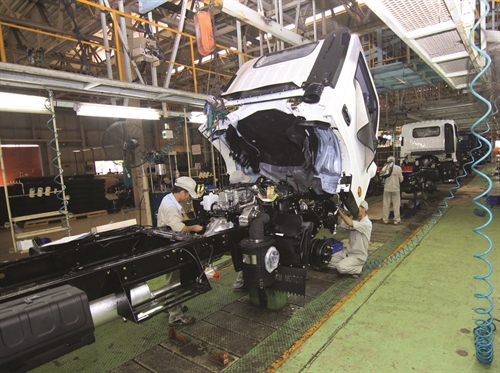 |
| Automobile assembly line at the Vietnam Engine and Agricultural Machinery (VEAM) Corporation in Bim Son town (Thanh Hoa province) __Photo: Vu Sinh/VNA |
Meanwhile, vehicles with engine displacement of over 6,000 cu.m will be subject to the highest excise tax rate of 150 percent instead of the current rate of 60 percent. Particularly, tax rate on vehicles with engine displacement of under 2,000 cu.m will be reduced by between 5 and 25 percent.
At present, locally assembled vehicles bear an import duty of 10-30 percent on spare parts, while imported completely built vehicles are taxed between 50 percent and 70 percent of their value.
A vehicle is also subject to excise tax of 40-60 percent, depending on its engine displacement; value-added tax of 10 percent, and corporate income tax of 22 percent.
Of the above taxes, only import duty will be reduced in line with Vietnam’s signed commitments upon entering bilateral and multilateral free trade agreements. Under the Trans-Pacific Partnership Agreement, import duty could be reduced by 2016 and eliminated by 2026.-
* Observance of pricing, competition regulations by foreign-invested aquatic feed traders to be investigated
Deputy Prime Minister Vu Van Ninh has asked the Minister of Finance (MOF) to coordinate with the Ministry of Industry and Trade (MOIT), public security and other relevant offices in scrutinizing the observance of price, tax and competition regulations by foreign-invested companies producing and trading feed for shrimp and fish and investigating whether they have indulged in pricing transfer.
Companies with a large share on the local market of feed for shrimp and fish will be inspected by the MOF to detect pricing and tax-related violations. Meanwhile, the MOIT will assess the competitive norms of these companies and provincial-level administrations will inspect the declaration and listing of selling prices by these companies.
As reported by the Ministry of Agriculture and Rural Development on the Government’s website chinhphu.vn, in recent years, some of these businesses have violated price regulations by failing to declare prices under regulations and by selling items for amounts that differ from the declared prices. The businesses that hold large market shares are not on the list of businesses that must declare prices as per existing regulations.-
